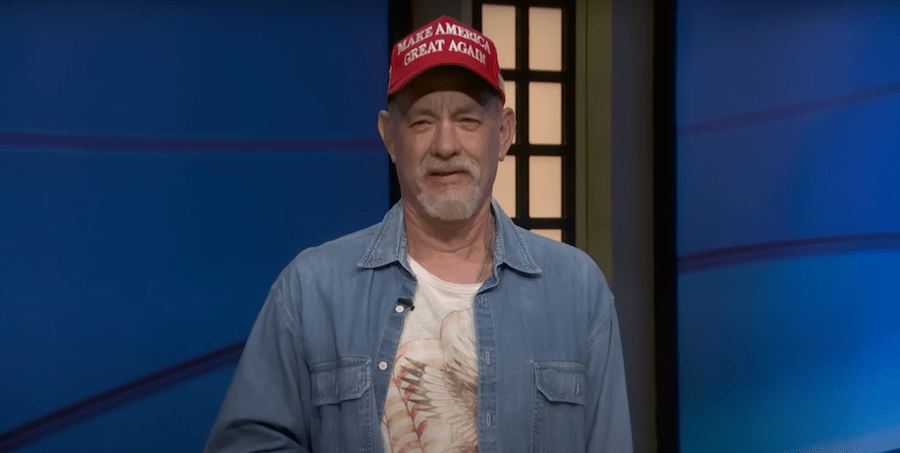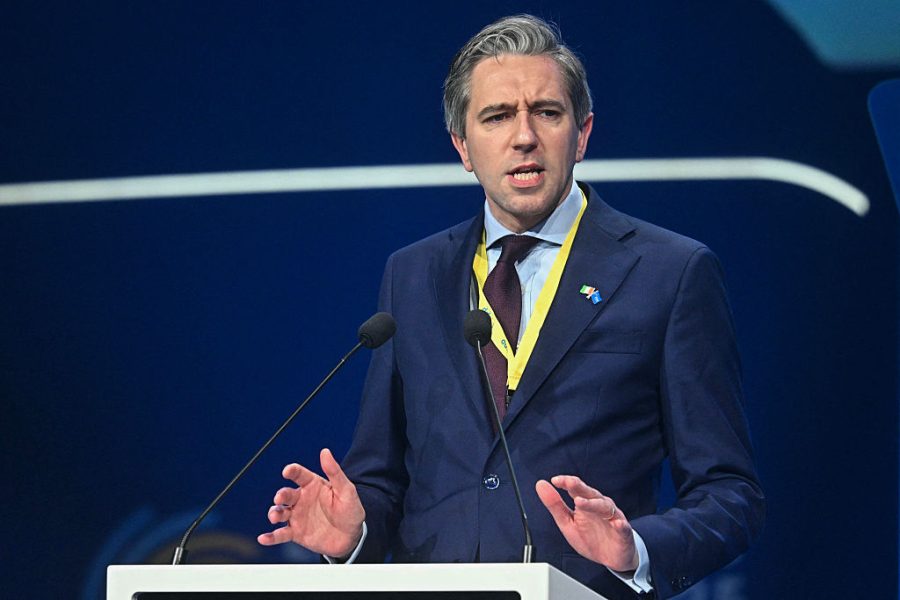We have long become accustomed to actors holding and sharing their progressive political views. So when David Tennant opened the Bafta awards on Sunday with a dig at Donald Trump, repeating the line that the American President is a dangerous moron, many people were annoyed, but few were surprised. Mechanically reciting fashionable mantras is what actors do, and Tennant, hitherto known for his vocal support for the trans movement, is no exception. The entire film Team America: World Police (2004) was founded on this reality about thespians.
When his counterpart on the other side of the Atlantic, Tom Hanks, did similarly at the weekend, there was, however, genuine shock. Appearing on the 50th anniversary special of Saturday Night Live, Hanks took performed a sketch he first took part in in 2016. Dressed as a slovenly hick, speaking with the voice of a slack-jawed yokel, Hanks put on a performance of what America’s liberals like to believe is a typical Trump supporter: a stupid, racist and religious bigot, a hillbilly who recoils from shaking hands with a black man.
This is not merely condescending and insulting, it sits in stark contrast with the public perception of Tom Hanks as a man for all people, one based on his big screen performances. He has built a film career by playing variations of the proverbial everyman: an unsophisticated, grounded Ordinary Joe placed in extraordinary circumstances – and circumstances that he overcomes through honest toil and guile.
On screen, Hanks has embodied the man in the street who wants a better life
In Big, the 1988 movie that propelled him to stardom, Hanks was an unexceptional teenager mysteriously transformed into an adult, who flourishes in his new strange environment to become a successful advertising agent. In Forrest Gump (1994) he was a physically disabled idiot savant who overcame adversity. In Apollo 13 (1995), he was an astronaut from a humble background who guided his stricken capsule safely back to Earth, and in Saving Private Ryan (1998) Hanks played an unassuming Pennsylvania schoolteacher who died a hero in battle.
On screen, Hanks has embodied the man in the street who wants a better life. In his screen roles, and by extension his public persona, he has come to represent a variation of the American Dream, an aspiration that many decent, ordinary people who voted for Trump would like to believe in.
The key word in the call to arms ‘Make America Great Again’ is the last one: again. Trump supporters do often hark back to times of old, and while nostalgia can be foolish or misplaced, longing for a healthy ethos and spirit of a previous age is not inherently unwise. While America did fail repeatedly over time to live up to its promise to treat all its people as equals, the aspiration itself remains a noble one. As does the aim to reward people justly for their efforts irrespective of their background, an approach that a race- and gender-obsessed ideology actively deplores.
The roles that propelled Hanks to fame chime with a homely, old-fashioned America still beloved by many normal folk. It’s no coincidence that Hanks has enjoyed a long and fruitful relationship with Steven Spielberg, a director whose films are typified by themes of overcoming odds and redemption. That’s why the liberal intelligentsia and Hollywood sophisticates have always sneered at Spielberg and his lack of nuance and ambiguity, for his tales in which good people confront and defeat bad people.
Hanks similarly projects an optimistic and benign attitude to life. This is what made his snide performance on Saturday Night Live so disconcerting. While he was superficially performing an impersonation of a Trump supporter, or a grotesque caricature of one, he was unwittingly also doing a good impression of an aloof and ignorant member of America’s celebrity elite.
These are the types who fail to acknowledge that it’s the very detachment of the liberal classes, beholden to voguish ideas often divorced from reality, that have alienated so many Americans from the Democratic party over the years, ensuring that they lost the presidential election in November. These are the echelons who have failed to recognise, or are in denial about the fact, that ethnic minorities and the blue-collar class have been drifting towards the Republican fold because of their luxury beliefs and bizarre concerns. Those who inhabit the ‘flyover states’ have little connection with the elites in Los Angeles and New York, with their undue concern with pronouns, intersectionality and the rest, the types who regurgitate views primarily to win approval from their peers.
The real-life actors of today have increasingly come to resemble their on-screen counterparts from Team America. As one marionette in the film puts it: ‘As actors, it is our responsibility to read the newspapers, and then say what we read on television like it’s our own opinion.’
It’s sad that Tom Hanks appears to have joined their ranks. It’s all the more unsettling for its dissonance. Regular people have always liked to believe that he represented ordinary, decent folk.







Comments